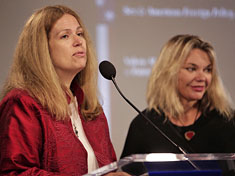-
Women’s Equality Not Just a Moral, But National Security Issue, Say Valerie Hudson and Patricia Leidl
July 10, 2015 By Linnea Bennett
“Compare those societies that respect women and those who don’t,” says Texas A&M Professor Valerie Hudson, quoting former USAID Deputy Administrator Donald Steinberg, in this week’s podcast. “Who’s trafficking in weapons and drugs? Who’s harboring terrorists and starting pandemics? Whose problems require U.S. troops on the ground? There’s a one to one correspondence.”
“Compare those societies that respect women and those who don’t,” says Texas A&M Professor Valerie Hudson, quoting former USAID Deputy Administrator Donald Steinberg, in this week’s podcast. “Who’s trafficking in weapons and drugs? Who’s harboring terrorists and starting pandemics? Whose problems require U.S. troops on the ground? There’s a one to one correspondence.”
The idea that the treatment of women and girls should play a major role in U.S. security and foreign policy is explored in Hudson and Patricia Leidl’s new book, The Hillary Doctrine: Sex and American Foreign Policy. The Hillary Doctrine gets its name from then-First Lady Hillary Clinton’s 1995 speech in Beijing in which she famously declared, “human rights are women’s rights and women’s rights are human rights.” Clinton’s term as Secretary of State led to important changes at the Department of State, but the framework for looking at the world has also taken on a life of its own. As Hudson and Leidl define it, the doctrine is based on two pillars:
- The subjugation of women is a threat to the common security of the world and the national security of the United States.
- The suffering of women and the instability of nations go hand in hand.
Hudson, who has spent the majority of her career researching the treatment of women and its effect on nation states, notes gender has appeared as a topic in U.S. foreign policy since the Nixon years. But Clinton’s rise to the role of Secretary marked a crucial moment in foreign policy where women not only became an intentional policy focus, they also played a role in shaping it, she says.
“It was considered to be an expendable…something of an indulgence”Reviews of how successful Clinton was in implementing her namesake doctrine have been mixed. Leidl, who spent years working for development organizations including UNFPA and USAID, says Clinton was successful in making gender a principal topic at the Department of State and other federal agencies, as well as creating frameworks that integrated the issue into existing work. But when it came to implementing initiatives to help women on the ground, the doctrine fell short.
In interviews with USAID employees, contractors, and other workers in the field, Leidl found that gender and women’s rights were more often viewed as a “pet rock.” “It was something that was an add-on,” says Leidl, “It was considered to be an expendable; considered to be something of an indulgence; something that was being done to please the higher-ups in Washington who didn’t actually know what they were doing.”
This was in part due to the attitudes of those who implemented the programs, including former military personnel who were not well equipped to navigate complex gender dynamics, says Leidl, as well as local contractors who were raised in patriarchal societies where the idea of gender equality and women’s empowerment was alien. Leidl and Hudson also point out that many women’s empowerment initiatives lacked concrete benchmarks, metrics, or goals, making it easy for programs to slip through the cracks.
Leidl and Hudson say Clinton’s four years at the Department of State yielded much better results for women than an alternative in which they were not considered at all. But their book concludes with recommendations for future administrations on how to further champion the rights of women and girls around the world.
“It may take a Hillary Clinton to get the ball rolling, but it’s up to everyone, including the president, vice president, the State Department, and other players, to keep the momentum up,” says Leidl.
Valerie Hudson and Patricia Leidl Spoke at the Wilson Center on June 24. Download their slides to follow along.
Friday Podcasts are also available for download on iTunes.
Topics: Afghanistan, conflict, democracy and governance, demography, development, featured, foreign policy, Friday Podcasts, GBV, gender, Iraq, livelihoods, military, podcast, QDDR, Saudi Arabia, security, State, USAID
 A Publication of the Stimson Center.
A Publication of the Stimson Center.




